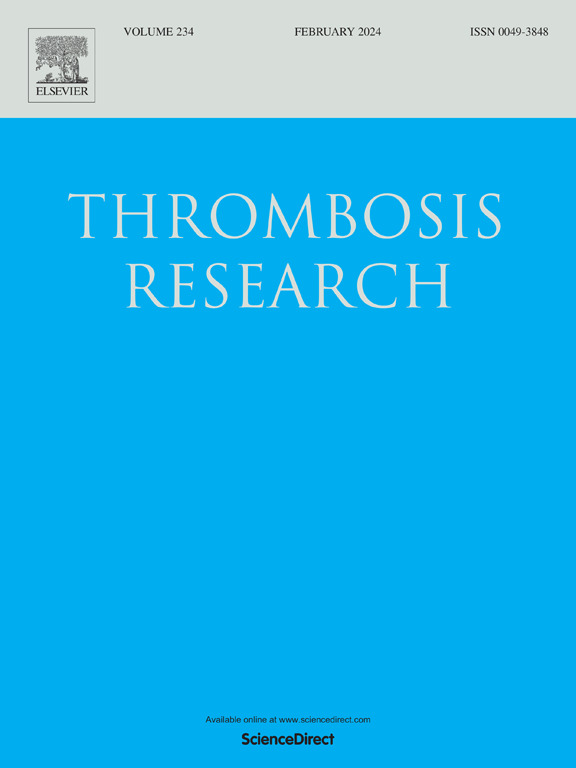The role of anticoagulation on the long-term survival of patients with pulmonary arterial hypertension: A meta-analysis of 15 cohort studies
IF 3.7
3区 医学
Q1 HEMATOLOGY
引用次数: 0
Abstract
Introduction
Anticoagulation was once recommended for patients with pulmonary arterial hypertension (PAH). However, its survival benefit still remained controversial. We performed a meta-analysis to evaluate the effect of anticoagulation on the long-term survival of PAH patients.
Methods
The PubMed, EMBASE, Web of Science, and WanFang electronic database were searched for eligible studies. Pooled hazard ratios (HRs) with 95 % confidence intervals (CIs) were calculated for effect estimate regarding anticoagulation on the survival of PAH patients.
Results
Fifteen cohort studies involving 4266 PAH patients were included. Approximately 45.8 % patients received anticoagulation. The mean follow-up period ranged from 2.1 to 14 years. Anticoagulation had a tendency to, however, did not significantly reduce mortality of PAH patients (HR: 0.86, 95 % CI: 0.73–1.02). In subgroup analysis, anticoagulation decreased the mortality risk as analyzed from retrospective studies (HR: 0.80, 95 % CI: 0.65–0.98), but not prospective studies (HR: 0.95, 95 % CI: 0.70–1.29). For both idiopathic PAH (IPAH) and connective tissue disease associated PAH (CTD-PAH), anticoagulation therapy did not significantly improve the long-term survival rate (HR: 0.83, 95 % CI: 0.65–1.07, and HR: 1.05, 95 % CI: 0.77–1.42, respectively), and this result remained unchanged when pooling data from either retrospective or prospective studies. Further analysis showed that anticoagulation had no advantage in reducing mortality in patients with systemic sclerosis associated PAH, systemic erythematosus lupus related PAH (free of antiphospholipid syndrome), or CTD-PAH of non-specified etiology.
Conclusion
Anticoagulation may not reduce the long-term mortality of PAH patients, including those with IPAH and CTD-PAH. In the management of PAH, anticoagulants should be prescribed with caution before comprehensive risk to benefit evaluation. Larger and more vigorously designed controlled trials are warranted.
抗凝对肺动脉高压患者长期生存的影响:15项队列研究的荟萃分析。
导言:抗凝疗法曾一度被推荐用于肺动脉高压(PAH)患者。然而,其对患者生存的益处仍存在争议。我们进行了一项荟萃分析,以评估抗凝对 PAH 患者长期生存的影响:方法:我们在 PubMed、EMBASE、Web of Science 和 WanFang 电子数据库中检索了符合条件的研究。结果:有 15 项队列研究涉及 PAH 患者的长期生存期:共纳入 15 项队列研究,涉及 4266 名 PAH 患者。约 45.8% 的患者接受了抗凝治疗。平均随访时间从 2.1 年到 14 年不等。抗凝有降低 PAH 患者死亡率的趋势,但并不显著(HR:0.86,95% CI:0.73-1.02)。在亚组分析中,根据回顾性研究(HR:0.80,95% CI:0.65-0.98)和前瞻性研究(HR:0.95,95% CI:0.70-1.29)分析,抗凝治疗可降低死亡率风险。对于特发性 PAH(IPAH)和结缔组织病相关 PAH(CTD-PAH),抗凝治疗并不能显著提高长期存活率(HR:0.83,95 % CI:0.65-1.07;HR:1.05,95 % CI:0.77-1.42),当汇总回顾性或前瞻性研究的数据时,这一结果保持不变。进一步的分析表明,抗凝对降低系统性硬化相关性 PAH、系统性红斑狼疮相关性 PAH(无抗磷脂综合征)或病因不明的 CTD-PAH 患者的死亡率没有优势:抗凝治疗可能无法降低 PAH 患者(包括 IPAH 和 CTD-PAH 患者)的长期死亡率。在治疗 PAH 时,应在全面评估风险与获益之前慎用抗凝药物。有必要进行规模更大、设计更严谨的对照试验。
本文章由计算机程序翻译,如有差异,请以英文原文为准。
求助全文
约1分钟内获得全文
求助全文
来源期刊

Thrombosis research
医学-外周血管病
CiteScore
14.60
自引率
4.00%
发文量
364
审稿时长
31 days
期刊介绍:
Thrombosis Research is an international journal dedicated to the swift dissemination of new information on thrombosis, hemostasis, and vascular biology, aimed at advancing both science and clinical care. The journal publishes peer-reviewed original research, reviews, editorials, opinions, and critiques, covering both basic and clinical studies. Priority is given to research that promises novel approaches in the diagnosis, therapy, prognosis, and prevention of thrombotic and hemorrhagic diseases.
 求助内容:
求助内容: 应助结果提醒方式:
应助结果提醒方式:


